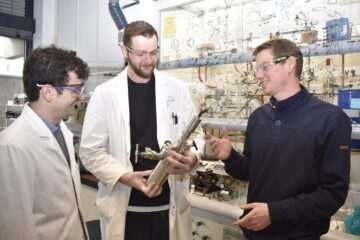People cause more soil erosion than all natural processes

Human activity causes 10 times more erosion of continental surfaces than all natural processes combined, an analysis by a University of Michigan geologist shows.
People have been the main cause of worldwide erosion since early in the first millennium, said Bruce Wilkinson, a U-M professor of geological sciences. Wilkinson will present his findings Nov. 8 at a meeting of the Geological Society of America in Denver, Colo.
Many researchers have tried to assess the impact of human activity on soil loss, but most have only guessed at how erosion due to natural forces such as glaciers and rivers compares with that caused by human activity—mainly agriculture and construction, Wilkinson said. He used existing data on sedimentary rock distributions and abundances to calculate rates of natural erosion. “If you ask how fast erosion takes place over geologic time—say over the last 500 million years—on average, you get about 60 feet every million years,” Wilkinson said. In those parts of the United States where soil is being eroded by human agricultural activity, however, the rate averages around 1,500 feet per million years, and rates are even higher in other parts of the world. Natural processes operate over areas larger than those affected by agriculture and construction, but even taking that into account, “the bottom line is, we move about 10 times as much sediment as all natural processes put together,” he said.
Because soil formation proceeds at about the same rate as natural erosion, Wilkinson’s results mean that humans are stripping soil from the surface of the Earth far faster than nature can replace it. “This situation is particularly critical,” Wilkinson said, “because the Earth’s human population is growing rapidly and because almost all potentially arable land is now under the plow.”
Media Contact
All latest news from the category: Earth Sciences
Earth Sciences (also referred to as Geosciences), which deals with basic issues surrounding our planet, plays a vital role in the area of energy and raw materials supply.
Earth Sciences comprises subjects such as geology, geography, geological informatics, paleontology, mineralogy, petrography, crystallography, geophysics, geodesy, glaciology, cartography, photogrammetry, meteorology and seismology, early-warning systems, earthquake research and polar research.
Newest articles

Lower dose of mpox vaccine is safe
… and generates six-week antibody response equivalent to standard regimen. Study highlights need for defined markers of mpox immunity to inform public health use. A dose-sparing intradermal mpox vaccination regimen…

Efficient, sustainable and cost-effective hybrid energy storage system for modern power grids
EU project HyFlow: Over three years of research, the consortium of the EU project HyFlow has successfully developed a highly efficient, sustainable, and cost-effective hybrid energy storage system (HESS) that…

Safer alternative for an explosive reaction
The chemical industry has been using a reaction with explosive chemicals for over 100 years – now Mülheim scientists have discovered a safer alternative. The Ritter Group of the Max…





















